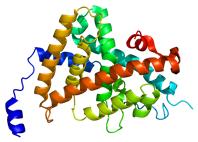Have you got:
o... low (F)T4,
o... high T3,
o... low rT3 (not that you would know because it is never tested),
o... normal TSH serum levels,
in combination with growth retardation, delayed bone development and constipation?
This paper (only the abstract is available to us mortals) might be of profound interest.
Published online before print April 30, 2013, doi: 10.1210/jc.2013-1050
The Journal of Clinical Endocrinology & Metabolism April 30, 2013 jc.2013-1050
Clinical phenotype of a new type of thyroid hormone resistance caused by a mutation of the TRa1 receptor; consequences of LT4 treatment
Alies A. van Mullem, Dionisios Chrysis, Alexandra Eythimiadou, Elizabeth Chroni, Agathocles Tsatsoulis, Yolanda B. de Rijke, W. Edward Visser, Theo J. Visser and Robin P. Peeters
Abstract
Context Recently, the first patients with inactivating mutations in TRa1 have been identified. They have low (F)T4, high T3, low rT3 and normal TSH serum levels, in combination with growth retardation, delayed bone development and constipation.
Objective The aim of the current study was to report the effects of levothyroxine (LT4) treatment on the clinical phenotype of two patients (father and daughter) with a heterozygous inactivating mutation in TRa1.
Setting and Participants Both patients were treated with LT4 for the last 5 years. To evaluate the effect of LT4 treatment, LT4 was withdrawn for 35 days and subsequently re-initiated. Data were collected from medical records, by re-analysis of serum collected over the last 6 years, and by a detailed clinical evaluation.
Results Treatment with LT4 resulted in a suppression of serum TSH, normalization of serum (F)T4 and rT3, whereas T3 levels remained elevated in both patients. In addition, there was a normalization of the dyslipidemia, as well as a response in serum IGF1, SHBG and creatine kinase in the index patient. All these parameters returned to pre-treatment values when LT4 was briefly stopped. LT4 also resulted in an improvement of certain clinical features, such as constipation and nerve conductance. However, cognitive and fine motor skill defects remained.
Conclusion This study reports the consequences of LT4 treatment over a prolonged period of time in two of the first patients with a heterozygous mutation in TRa1. LT4 therapy leads to an improvement of certain but not all features of the clinical phenotype.
jcem.endojournals.org/conte...
Rod
Image is Structure of the THRA protein.

 The lengths we have to go to prove something patients and certain docs have been saying for years!! Shame they don't apply the adage 'the proof is in the pudding' cos if they did they would have to open their door much wider than levothyroxine....
The lengths we have to go to prove something patients and certain docs have been saying for years!! Shame they don't apply the adage 'the proof is in the pudding' cos if they did they would have to open their door much wider than levothyroxine....